medics
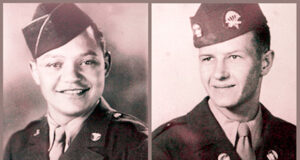 There were a number of events that took place on June 6, 1944, also known as D-Day. The areas of the Allied attack were miles away from each other. Early that morning, the Allies dropped thousands of allied paratroopers behind enemy lines in anticipation of the invasion of Normandy. It seems a strange idea to drop them behind enemy lines…like it was a big mistake. Nevertheless, one of the main objectives of the 101st Airborne was to capture the small village of Angoville-au-Plain. Then, when intense fighting broke out over the village, they dropped two American medics, Robert Wright and Kenneth Moore, in to set up a medical station in the tiny town
There were a number of events that took place on June 6, 1944, also known as D-Day. The areas of the Allied attack were miles away from each other. Early that morning, the Allies dropped thousands of allied paratroopers behind enemy lines in anticipation of the invasion of Normandy. It seems a strange idea to drop them behind enemy lines…like it was a big mistake. Nevertheless, one of the main objectives of the 101st Airborne was to capture the small village of Angoville-au-Plain. Then, when intense fighting broke out over the village, they dropped two American medics, Robert Wright and Kenneth Moore, in to set up a medical station in the tiny town 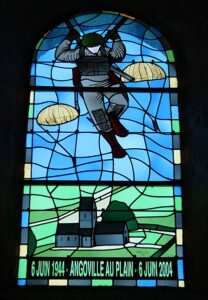 church. So, now they had not only had troops behind the lines, but they have medics…without guns behind the lines too.
church. So, now they had not only had troops behind the lines, but they have medics…without guns behind the lines too.
The plan to take over the village worked quickly and well. United States paratroopers established control of Angoville-au-Plain, but just as quickly, German units counterattacked and forced American troops back. Because of multiple injuries, Wright and Moore stayed behind. Suddenly they found themselves in danger when German soldiers entered the church. At first the German soldiers were hostile to the Americans, but then they realized that the medics were treating their wounded, as well the Allied wounded. The German troops could have attacked the men, and walked away without penalty, but instead, they left, posting a Red Cross flag at the entrance.
The fighting in the area raged on for three days, and the village changed hands several times, but the two medics never missed a beat. Over the course of the three days, they saved 80 lives, including a local teenager. The amazing part of the whole thing wasn’t just that they saved the lives, but also that the German soldiers didn’t kill them 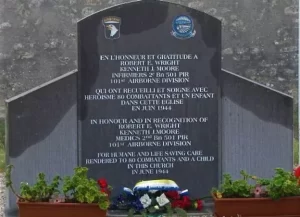 in the first place. I’m sure the medics thought that was an amazing thing. The little village of Angoville-au-Plain thought is was amazing too…not just the work of the medics, but also the work of the 101st Airborne. They thought it was amazing enough to make sure it was remembered
in the first place. I’m sure the medics thought that was an amazing thing. The little village of Angoville-au-Plain thought is was amazing too…not just the work of the medics, but also the work of the 101st Airborne. They thought it was amazing enough to make sure it was remembered
Today, all of the stained glass windows in the church (the originals were destroyed in the battle) are tributes to Wright, Moore, and the 101st Airborne. Wright visited the church in 2004, and some of his ashes were spread in Angoville-au-Plain’s cemetery as per his request, following his death on December 21, 2013. Moore passed away on December 7, 2014.
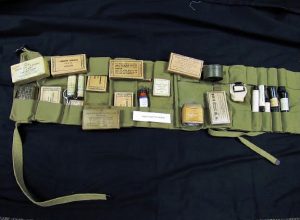 During World War II, if a man was a conscientious objector, things were…difficult. Things like that were not an automatic get out of the war card. Unless they had some necessary skill that would keep them stateside or in an office, they were signed up as a medic. Most of those men thought that was a good place for them, since the would be saving lives and not taking them, but I’m not sure who got it worse. The infantry or the medics.
During World War II, if a man was a conscientious objector, things were…difficult. Things like that were not an automatic get out of the war card. Unless they had some necessary skill that would keep them stateside or in an office, they were signed up as a medic. Most of those men thought that was a good place for them, since the would be saving lives and not taking them, but I’m not sure who got it worse. The infantry or the medics.
The men of the infantry usually considered the conscientious objectors to be cowards. That is not really the way a guy wanted to go into the army, but if they were seriously conscientious objectors, it was a calling they took seriously. 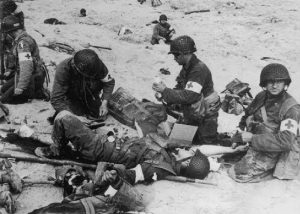 It was not, however, an easy job or the easy way out of combat. The difference between the infantrymen and the medics was that during combat, the infantrymen did their best to stay down, so the weren’t hit. The medics, on the other hand, ran into the fire to treat the wounded, and bring in the dead. It was no easy job.
It was not, however, an easy job or the easy way out of combat. The difference between the infantrymen and the medics was that during combat, the infantrymen did their best to stay down, so the weren’t hit. The medics, on the other hand, ran into the fire to treat the wounded, and bring in the dead. It was no easy job.
The medics, like most soldiers coming into the army were young men…boys really. They were often 18 or 19 years old. The infantrymen had plenty of names for them. None of them were nice…or complimentary, but the medics that stayed medics…the ones who ran into the fire to care for a wounded soldier were given new names. They were finally called medic…or more often Doc. And they were respected. They were also called hero, brave, courageous, and other respectful names. The 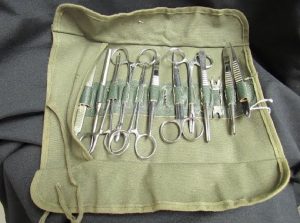 medics were not given the $10.00 per month extra that combat soldiers were given. That made the infantrymen furious. They collected money from each other to provide combat pay for their medics. The men refused to have their medics receive less.
medics were not given the $10.00 per month extra that combat soldiers were given. That made the infantrymen furious. They collected money from each other to provide combat pay for their medics. The men refused to have their medics receive less.
World War II saw eleven medics who received the Medal of Honor…as well as other medals. These men were wounded taking care of the men, and they were even killed saving the lives of the men in their care. These men were heroes, just like their counterparts in the infantry, and there isn’t an infantryman that ever fought, who would disagree.

